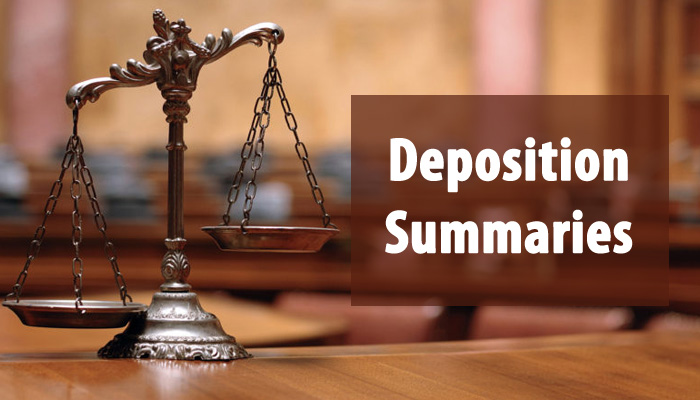Managing documents and other paperwork in legal proceedings becomes a headache for law firms. That’s why many law firms opt for litigation support services to streamline deposition summaries efficiently. Deposition summaries are crucial when preparing for a case, yet they are time-consuming. Lawyers are often busy with client discussions and witnesses. So, seeking help from a reliable third-party firm ensures improved efficiency.
An Overview of Deposition Summaries
It distill crucial case-related information for convenience. They can be organized by topic or chronology, in page-line or narrative formats. Page-line summaries provide quick access to specific points on each page.
- A deposition captures facts and relevant details from legal parties.
- Written ones are known as interrogatories.
- Oral depositions are sworn statements and are legally binding.
- The person giving testimony is the deponent, represented by their attorney.
- Depositions can be lengthy and contain extraneous data.
What are the Types of Deposition Summary Services
There are several types of deposition summary services available, each tailored to meet specific needs in the legal industry. These services include:
1. Full Deposition Summaries:
These summaries provide a comprehensive overview of the entire deposition, including key points, witness statements, and relevant details.
2. Topic-Specific Summaries:
These summaries focus on specific topics or themes within a deposition. Attorneys can request summaries that emphasize aspects of the case, making it easier to extract relevant information.
3. Chronological Summaries:
Chronological summaries organize deposition information in the order it was presented during the deposition.
4. Page-Line Summaries:
Page-line summaries track essential points in the deposition by both page and line number. This format aids in quickly locating specific information within a lengthy deposition transcript.
5. Narrative Summaries:
Narrative summaries provide a cohesive narrative of the deposition, presenting the information in a storytelling format. This can be useful for attorneys who want a more contextual understanding.
6. Expert Witness Summaries:
These summaries focus on the testimony of expert witnesses, highlighting their qualifications, opinions, and the key points they make during the deposition.
7. Witness Profiles:
Witness profiles provide detailed information about each witness. It includes their background, role in the case, and key statements made during the deposition. This can help attorneys prepare for cross-examination.
8. Exhibit Summaries:
If exhibits were presented during the deposition, these summaries can catalog and explain the significance for easy reference.
9. Multi-Deposition Summaries:
In cases involving multiple depositions, these summaries consolidate information from various witnesses or testimonies.
10. Customized Summaries:
Some summary services offer customized options, allowing attorneys to specify their unique requirements and preferences for the summary format and content.
What are the Benefits of Outsourcing Deposition Summaries?
-
Efficient Trial Preparation
These summaries help identify case facts and determine trial witnesses and exhibits. They also prepare you for cross-examination of other witnesses.
-
Reduced Error Risk
Outsourcing summaries minimizes mistakes. Transcribing hours of audio increases the chance of errors. Outsourcing ensures comprehensive and error-free summaries.
-
Cost Savings
In-house summarization can be costly with hourly wages, software, and training expenses. Outsourcing eliminates these overheads, saving your business money.
-
Time Efficiency
Summarizing depositions consumes significant time for your team. Outsourcing frees up valuable time for other tasks, streamlining your workload.
Key Considerations When Choosing an Outsourced Provider
-
Expertise and Experience
Ensure the provider has a proven track record in deposition summarization. Look for experience in handling various legal cases and types of depositions.
-
Quality Assurance
Inquire about their quality control processes to guarantee accurate and error-free summaries. Ask for sample summaries to assess their standards.
-
Data Security
Confirm their commitment to data security and client confidentiality. They should have robust measures in place to protect sensitive legal information.
-
Turnaround Time
Discuss expected delivery times for summaries. Timely delivery is crucial for trial preparation and case management.
-
Customization
Seek a provider willing to tailor their services to your specific needs. Customization ensures that the summaries align with your case strategy.
-
Pricing Structure
Understand their pricing model and ensure it aligns with your budget. Be clear about any additional charges or fees.
-
Technology and Tools
Inquire about the technology and software they use for summarization. Up-to-date tools can improve efficiency and accuracy.
Outsourcing these services is a smart choice if your firm doesn’t have the necessary workforce or expertise to produce deposition summaries in-house.
Outsourcing is a cost-effective and efficient solution that ensures top-quality work for your clients while freeing up your time to concentrate on critical aspects of your practice.
Get in touch with Legal Support World today to explore how our deposition summary services can benefit your legal practice.


